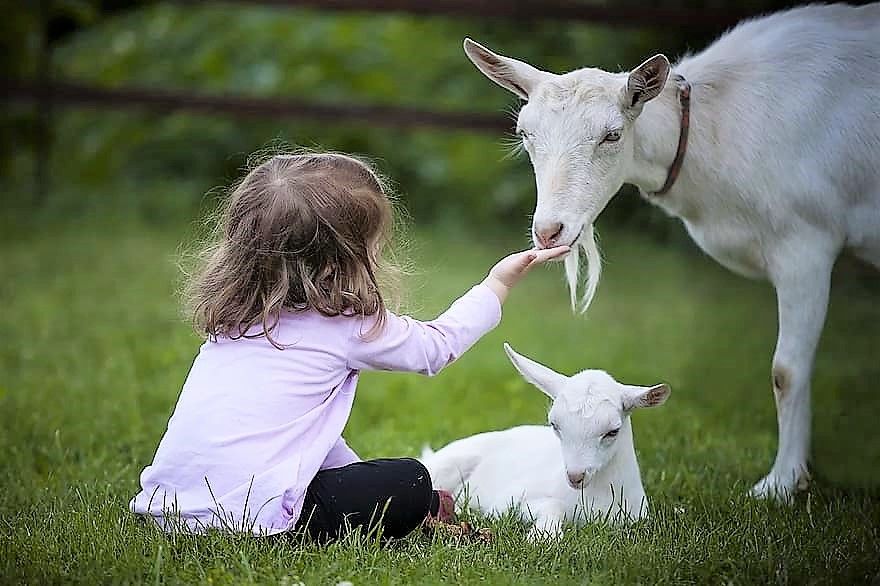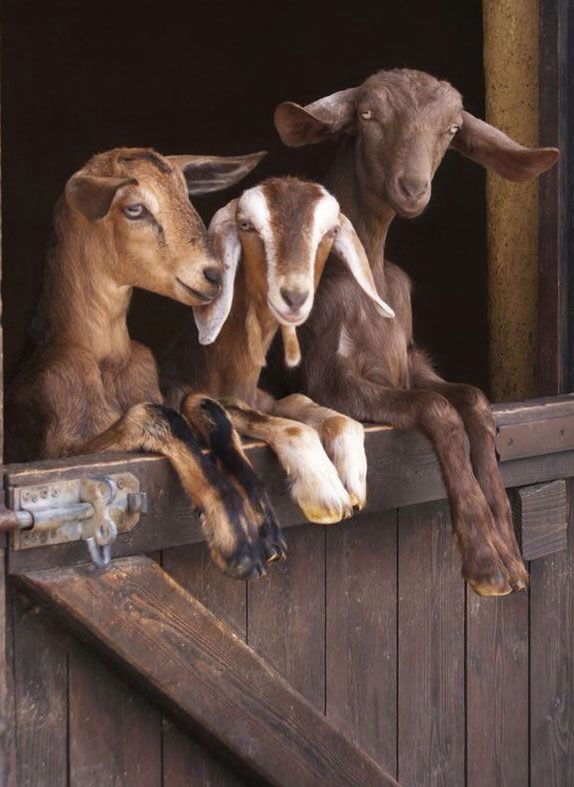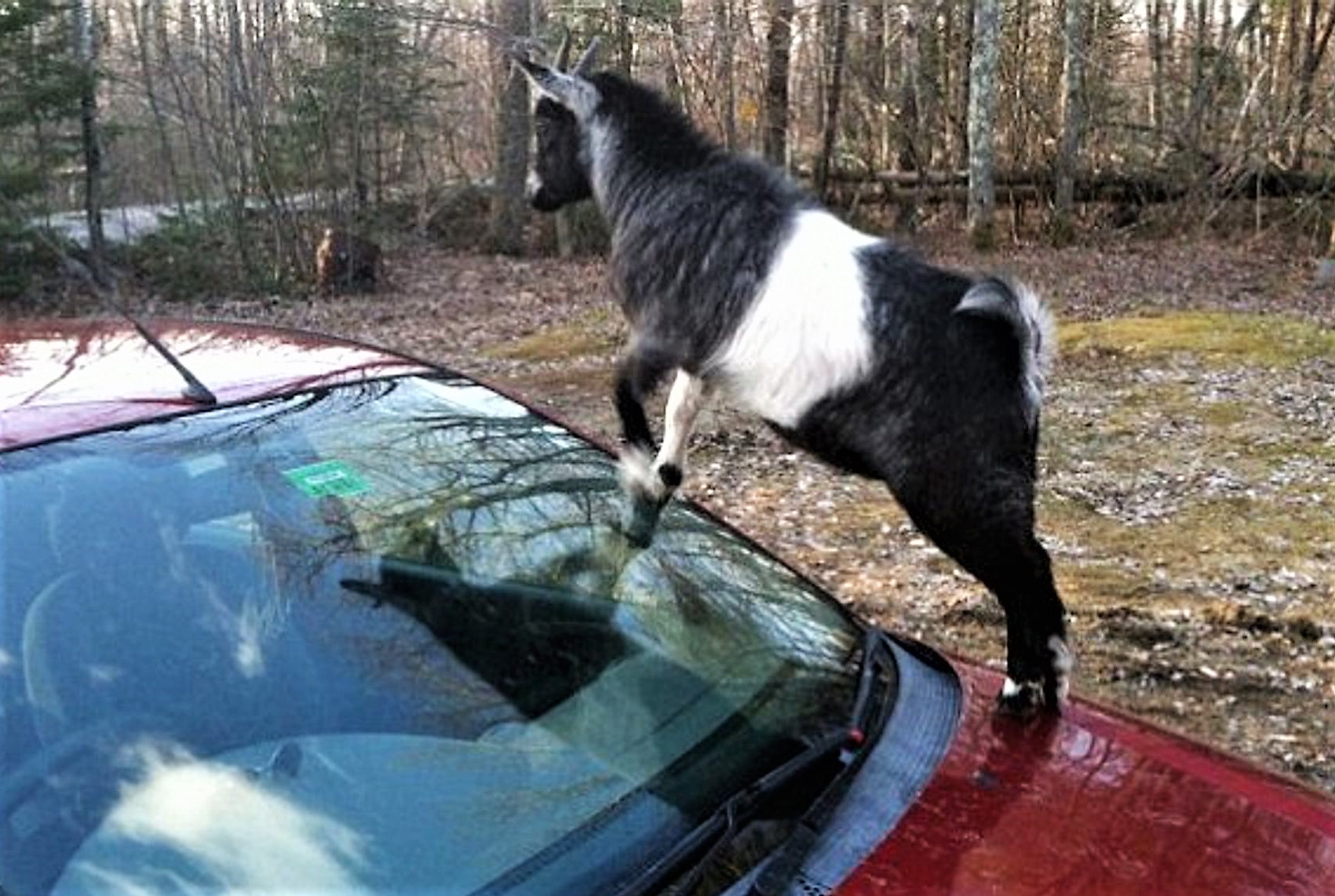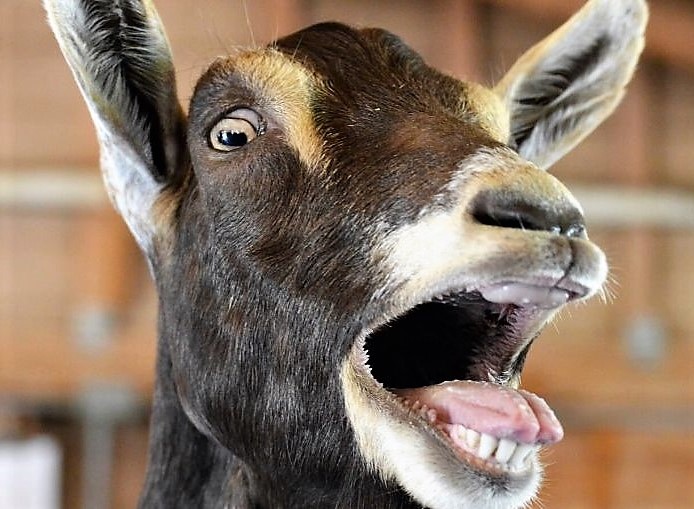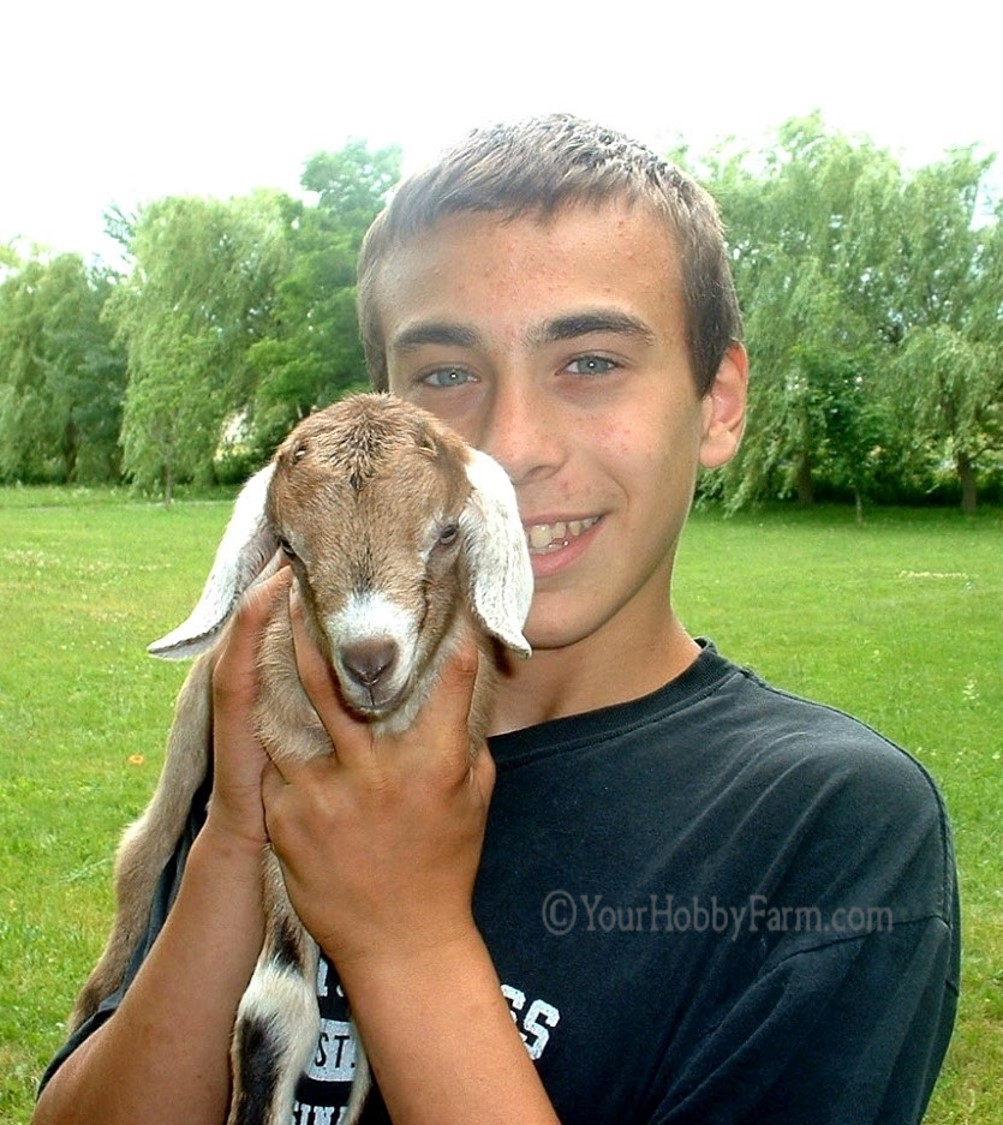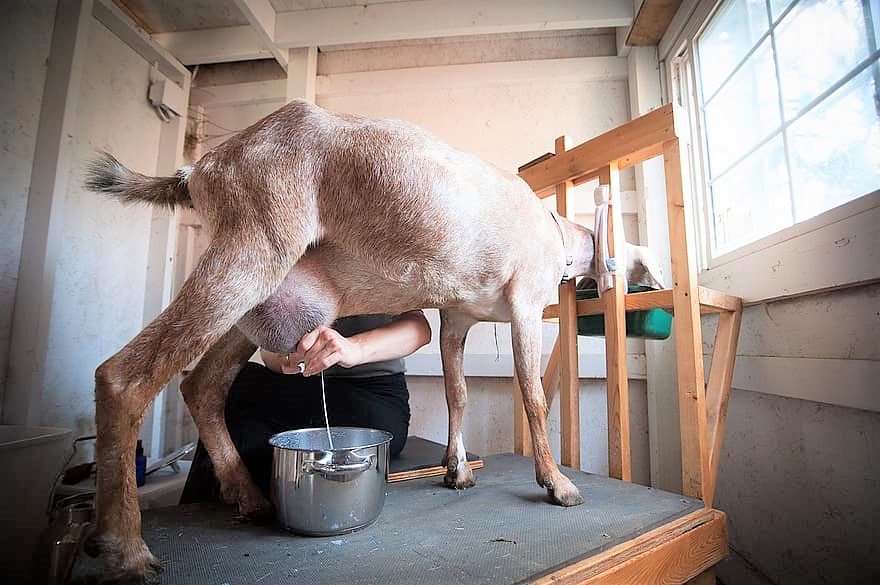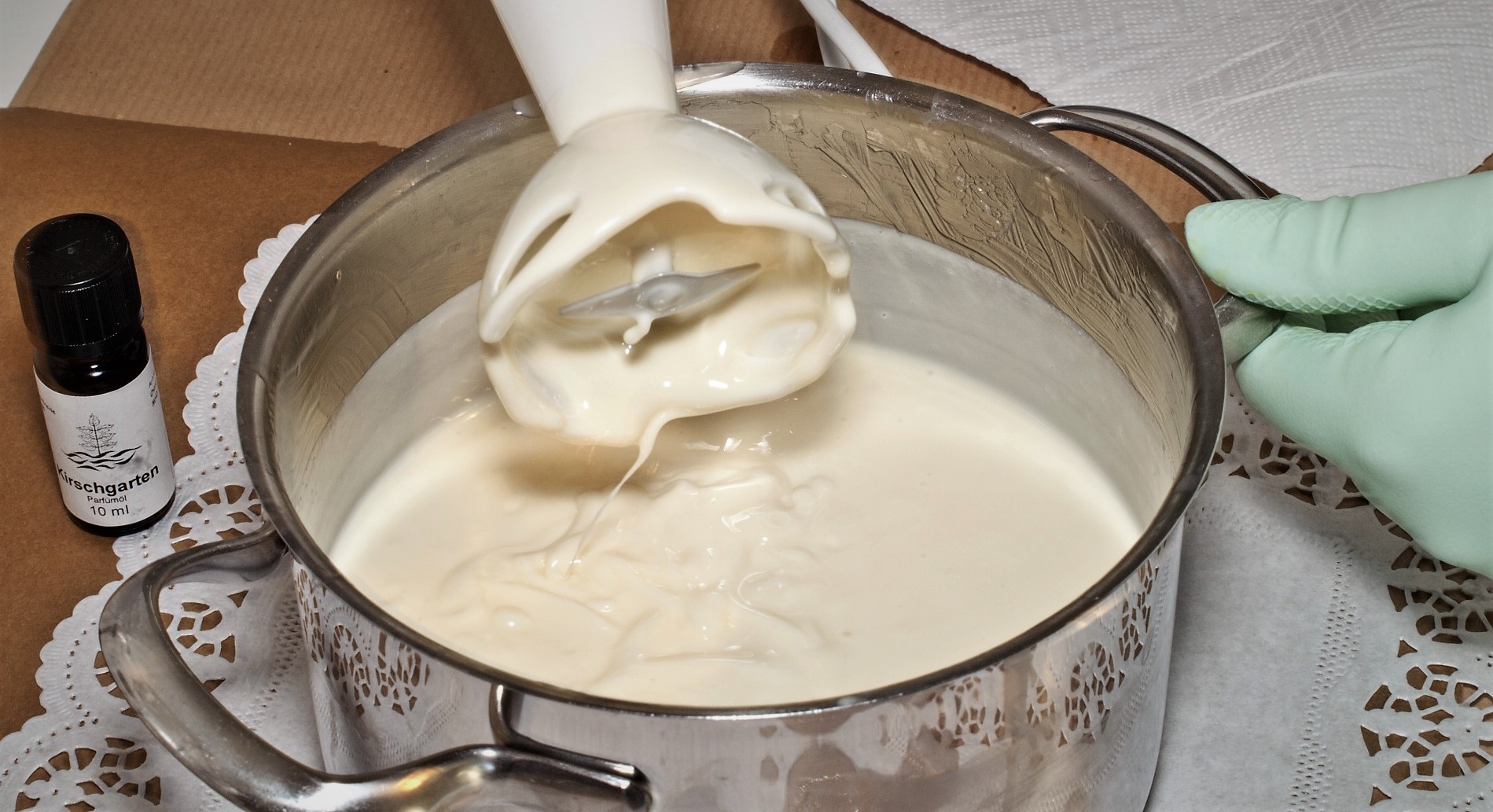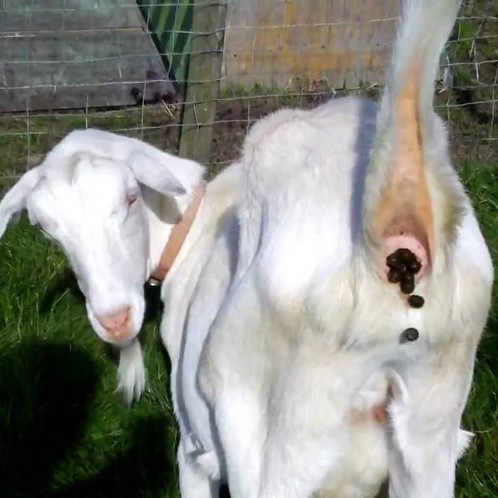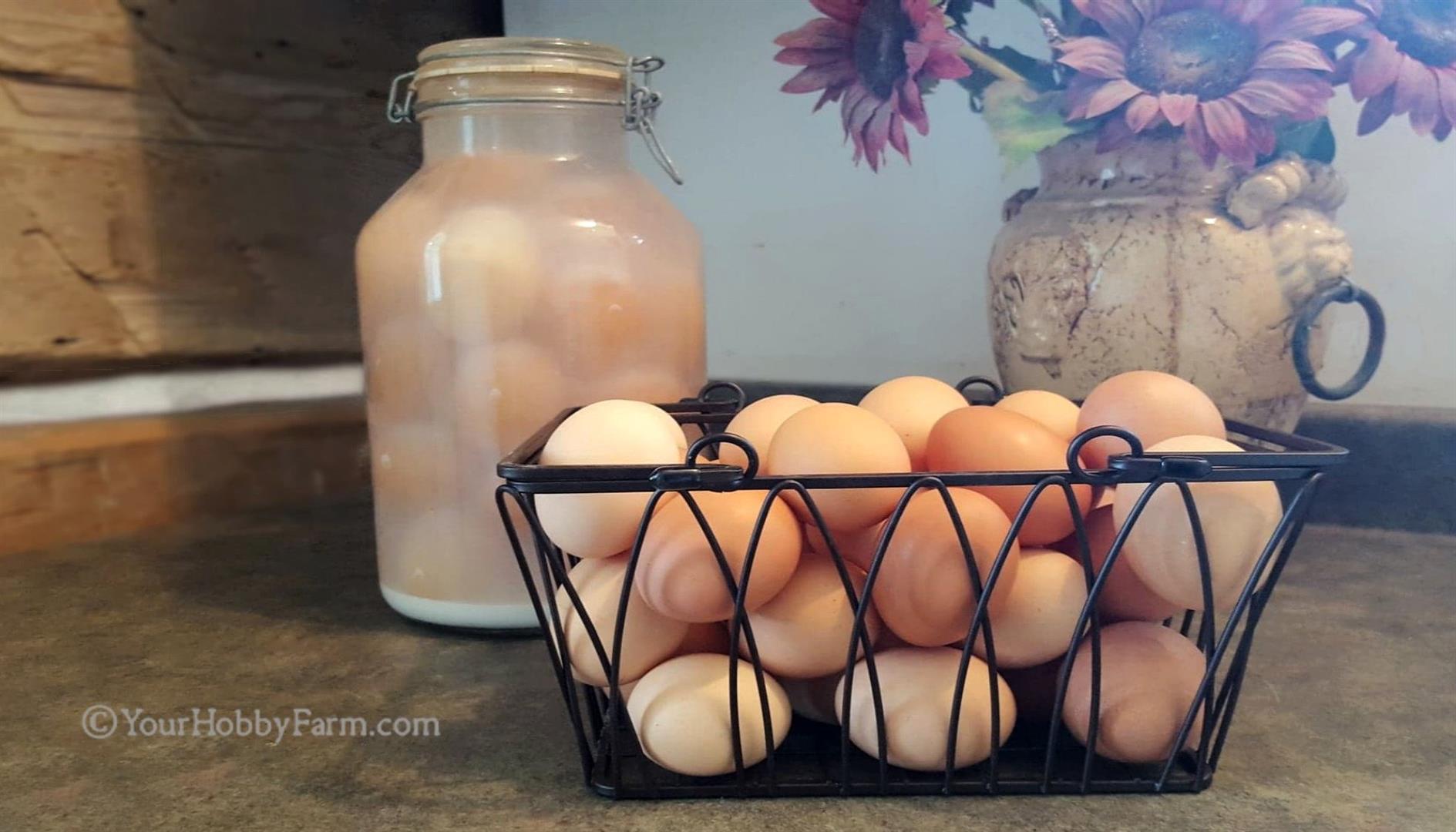Raising Goats
Hey friends and followers! We're changing our website address from YourHobbyFarm.com to HomesteadJoys.com.
With ongoing homestead responsibilities, this transition may take some time. Save our New Logo and QR code for easy navigation! We’d love you to join us in our journey!
 Homestead Joys Logo
Homestead Joys LogoThere seems to be a sweet, rustic charm associated with raising goats. Some who have owned goats will tell you that they can be addictive. They grow on you in more ways than one! Starting out with two may soon add up to twelve... As a goat keeper, you know that goats can be fun, profitable, and occasionally challenging. Yep, every once in a while, these adorable, smart critters can "really get your goat" when you discover another thing that they've gotten into or have figured out!
What is so great about raising goats? Well, goats are one of the most versatile farm animals. Because of their size, they're easier to handle that larger livestock and they can eat less. They're good for milk, meat, fiber, and more.
All around the world, goat keeping is an important part of many people's lives, especially in Africa, Latin America, the Middle East, and Asia. A goat can make a huge difference for a family, especially in poverty stricken areas.
But no matter the circumstances of life, the benefits of raising goats can certainly help support a self-sustaining lifestyle. Here in North America many hobby farmers and homesteaders will agree that goats can be a great choice as a multi-purpose livestock.
Raising Goats for Beginners
Goats are definitely cute, fun and productive. But the decision to keep goats should never be taken lightly. Raising goats for beginners presents a steep learning curve. How well you prepare beforehand can either make or break your goat keeping experience.
Your first vital step is to find out if goat keeping is allowed where you live. If so, then do thorough research and acquire as much practical, applicable knowledge about goats as possible, which we'll help you with.
You'll need to choose the best breed for your needs, and for your setting as well. An experienced mentor, if you can find one, is a wonderful asset.
You'll also need to have proper shelter, goat-proof fencing, feed, some equipment ready before bringing your goats home. Take preemptive measures to reduce any possible problems that you may think of.
It's important to know ahead of time that goats take a lot of time and care. You'll also need to consider the financial requirements of feeding and maintaining the needs of your goats. Make sure that you have access to local resources such as vets, feed store, and a source for breeding if you're hoping to milk them.
Goat Keeping Pros and Cons
Perhaps you're enamored by all things caprine and have been raising goats in your daydreams? Being aware of realistic pros and cons before investing your money, time and heart into goat keeping is a very important first step!
There are several advantages to raising goats. They can support a self-sustaining lifestyle. Goats are fun, smart, curious, adventuresome, and affectionate. They offer many benefits that make them productive and profitable, like milk, meat, and fiber. Goats can make great pets. And work goats are excellent for assisting humans.
But there are disadvantages to raising goats as well. Goats can be very loud and insistent. They are skilled escape artists. They don’t respect boundaries. Goats can be pesky, mean and destructive. Every goat owner will have a tale about 'that goat' who knew no bounds...
Generally, goats that are not hungry, bored or lonely tend to be happier and more content, and will be less quick to misbehave.
Backyard Goat Keeping
We've all noticed the rise in popularity of raising backyard chickens in many of North America's urban areas. But another trend that's growing is backyard goat keeping.
Before getting your heart set on keeping backyard goats, the very first thing you need to do is to find out if your county, municipality or homeowners association allows goats where you live. One very real concern is their noise! Another concern is their ability to escape their enclosures.
And know that if you intend to get only one goat, which we would definitely discourage, you'll probably have double the trouble. A lonely goat can be loud and even destructive.
If goats are allowed where you live, choose a breed that tends to be quieter. Either two does or a doe and a wether would be best. Before bringing your goats home, have a solid, safe, dry shelter for them, a high goat-proof fenced enclosure, and climbing structures and other things to keep them happy and busy. You'll need some necessary equipment for them as well as food, which we'll be covering on our Backyard Goat Keeping page.
And please don't even consider bring a billy goat to your neighborhood. You and all your neighbors will regret it not only because of their noise, but because of their intensely negative scent and their very poor 'hygiene habits' as well.
Just One Goat?
A common mistake that people make is that they often start by getting just one goat.
Goats can enjoy interacting with humans and once in a while having a goat alone may work, but that's rare.
We'd discourage having just one goat. Goats are very social herd animals by nature. They feel alone without the companionship of their own kind. Being alone is not natural for goats, and having just one by its self is hardly fair to the animal. They don't feel safe and secure when there's no other goat round.
Besides the goat being miserable, it wouldn't be fun for you either because a goat can be very expressive! You'd probably have to put up with excessive, loud, frequent bleating. Boredom and loneliness can drive this otherwise docile farm animal to aggressiveness and possibly destructive behavior. Having more than one goat will keep them, yourself, and your neighbors much happier.
Keeping Goats as Pets
Yes, goats as pets can be entertaining and a lot of fun. I have fond childhood memories of our adventures with our beloved pet nanny goat, Sally. She was not only a wonderful milk goat and a great mama to her kids, but she was also a beloved pet to us 5 human kids on our farm. My children also very much enjoyed having goats to play with when they were young.
Goats are social and affectionate creatures. And since goats are smart and curious animals, they can be trained. Goats can learn to be lead on-leash and you can enjoy going for walks together. They can also be taught fun and entertaining tricks like jumping through hoops or walking a beam, or other tricks that you'd train a dog to do. Goats are fast learners. They're observant and constantly learning, whether we want them to or not. Channeling this intelligence and keeping their minds busy is good for them.
But sometimes goats simply enjoy hanging out with their humans. For some, being with you makes them contented and happy. By building trusting relationship and communication between you and your goats, you will find handling and caring for them can be quite enjoyable for both you and your goats.
Benefits of Raising Goats for Milk
Many people raising goats for milk do so to provide healthy, fresh milk for their families. Goats are smaller to handle than cows and are generally easy to milk. They produce a good amount of milk for their size.
Some favorite dairy goat breeds are Alpine, Nubian, Nigerian Dwarf, Saanen, Toggenburg, LaMancha, and Oberhasli. Each has its own unique characteristics. Some people raise goats for milk because they prefer goats milk to cows milk. What's so special about goats milk?
One of the benefits of fresh goats milk is that it's alkaline. Another benefit is that goats milk, as is true with a few breeds of cows like Dexters, is always A2 (A2 beta-casein milk protein).
Besides drinking their milk, people make cheese, soaps and lotions. Goats milk is naturally homogenized because the fat globules are smaller than those in cows milk. Because of these smaller fat globules, goats milk products are creamy and smooth.
Raising Goats for Meat
Another great way to support a self-sustaining lifestyle is raising goats for meat. Goat meat, or chevon, hasn't been a traditional red meat here in North America, but all around the world people have enjoyed and benefited from goat meat for many centuries.
Any goat can be used for meat, but some breeds like Boer goats, *Spanish goats, Savannahs, and Kikos are among those recognized as meat breeds. I haven't tasted chevon, but I've heard that it's a delicious, low-fat, mild-flavored meat similar to lamb.
A real advantage to raising your own goats for meat is knowing exactly what’s in the meat since you have fed and raised your goats. Raising meat goats not only provides a great source of protein for your family, but it's also an opportunity to earn a bit of extra funds to invest back into your sustainable and self-reliant efforts, as well.
* Spanish goats are an example of multi-purpose goats. They are great brush goats that have been valued for their milk, meat, fiber and hide.
Raising Goats for Fiber
If you've ever wrapped yourself in the snuggly warmth of a Mohair sweater or the ethereal softness and thermal comfort of a cashmere sweater, you can thank a goat. Some of the most luxurious fibers are produced by these humble weed-eaters.
Mohair is from Angora goats, while Cashmere is a fiber that comes from several other breeds of goats. The longer fibers are used in knitted garments. Shorter cashmere fibers go into woven fabrics.
Cashmere is from the goat’s soft, downy undercoat that grows as an insulation against the winter cold and then sheds in early Spring. There are several breeds that produce cashmere. Among them are Pashmina goats, Kashmir goats, Spanish goats, and Nigora goats.
Raising Goats for Profit
If you're interested in raising goats for profit, there are several ways that you might be able to do that. A few of these ideas...
Sell your goats milk and cheese (if the area in which you live allows you to do so). If raising meat goats, you can sell goat meat.
You can sell breeding pairs, or breed and sell the kids to others who are getting into raising goats or looking for pets. You may also sell milking goats that are lactating, or wethers, which make great companion animals. If you have a billy goat, you can charge a stud fee for his services.
You can also make and sell wonderful products from your goat milk. Creamy goat milk soaps, lotions, and other bath products are wonderful for the skin.
And of course, there is also the fiber that certain breeds of goats provide for soft, luxurious yarns and fabrics.
Sometimes people feel the need to interact with animals. Pet goats can be great therapy animals. You could host goat related birthday parties, or hands-on goat care seminars and charge for these services.
You can also rent out your goats for brush clearing or, if trained properly, as pack goats. There are other creative things that a person raising goats for profit can explore as well.
Working Goats
Wethers are often the best as working goats. Goats have been used as harness animals for several thousand years. Cart training a goat can take a bit of time and patience, but the effort is well rewarded by your four-legged helper.
Goats are also great as pack animals. When hiking, they can accompany you to carry the gear. Goats are able to carry 20 to 30 percent of their body weight. And since they're natural surefooted climbers, they have no trouble navigating steep, rocky paths. Packing food for them is unnecessary because goats browse as they travel with their humans.
And another task for some working goats is clearing brush. As someone once said, "Choose Herds over Herbicides". Goats love to eat, which is why this line of work also comes natural to them. Renting goats has actually become the "green" way to clean up unwanted brush both in outlying areas as well as in urban and industrial areas. Parks, solar farms, and many other settings are hire goats for clean-up.
Goats also work as therapy animals. Sometimes these affectionate critters are trained to help their owners give back to the community by visiting schools, assisted-living facilities, and community centers. They are good at bringing smiles and comfort to people going through challenges in life.
Manure: The Scoop on Goat Poop
Goat droppings are quite useful as well! One of the most common uses for goat manure is as a fertilizer. Their pelletized droppings are light to work with, mix into the soil nicely, and don't attract as many insects as other manures. Additionally, because it's a 'cool fertilizer', it doesn't burn the plants.
Goat manure piles can spontaneously combust. While we don't do so here in North America, people all over the world that use goat dung to fuel fires. Goat manure is dryer than other manures. One person who has tried this said, "dried manure actually was a useful and usable heating fuel, and it didn’t stink up the place one bit."
Someone else observed that, even better for healthy gardens than the goat dung itself is the manure ash after using it as a heat source.
And don't forget that there can be a profit made in selling your little dried 'goat berries'. Goat-less gardeners will pay good money for the burst of life derived from your four-legged weed-eaters.
And a Few Fun Facts About Goats...
As you know, goats are interesting and unique creatures. When we had goats, I used to appreciate God's humorous creativity in these creatures of His. Here are a few fun facts...
Want to get on a goat’s good side? Start with a smile! Goats are able to distinguish a happy human from a sad one and they seem to be drawn to happy humans!
Goats are rather picky eaters! It's an myth that they eat anything including tin cans! They are quite curious, and like little children, they use their mouth to examine, 'taste', or chew on new things they encounter. But that doesn't equate to eating.
Goats, as with other ruminant animals, don't have upper front teeth. Their strong, hard dental pad helps them to process their food. Goats do have bottom front teeth and molars on the upper and lower jaw that they use to grind up their food. These are very sharp, even in little kids.
Goats' eyes have rectangular pupils giving a wider field of vision. They can see 320-340 degrees around them without having to move. Also, their eyes rotate significantly in their sockets, allowing their pupils to stay aligned with the ground whether their head is up or down!
'Goat alarms' are quite intense and seriously funny - they snart! We've watched our goats send out an alarm by standing shoulder to shoulder on top of a large rock, sneezing and farting simultaneously! The object of concern was a stray dog who was being warned to stay away in no uncertain terms!
We'd love to hear your goat stories, helpful experiences, questions or more fun facts! You can share them in the form below, and don't forget to include your goat pix! We'd love to see them!
K.V. 4410 3645 1210
Translate This Page!
Traduire Cette Page!
¡Traduzca Esta Pagina!



Piping Rock©
Bringing you the highest quality In hundreds of health care and life-enhancing natural products at the
lowest cost to you!
high reviews, crazy deals,
happy, healthy customers!
Click here and save today!
Business Appreciation
* This website is not affiliated with
Piping Rock

Supporting our local feed mills
Meunerie Alexandria Milling
613-525-1973
Great Products • Great Prices
Great Service
Click the pic for their
facebook page!
Meunerie Alexandria Milling
Established in 1962 by The Massie Family
Email: Alexandriamilling@hotmail.Ca
475 Massie Crescent
Alexandria, Ontario, Canada
~~~
Small Business Appreciation
* This website is not affiliated with
Meunerie Alexandria Milling

